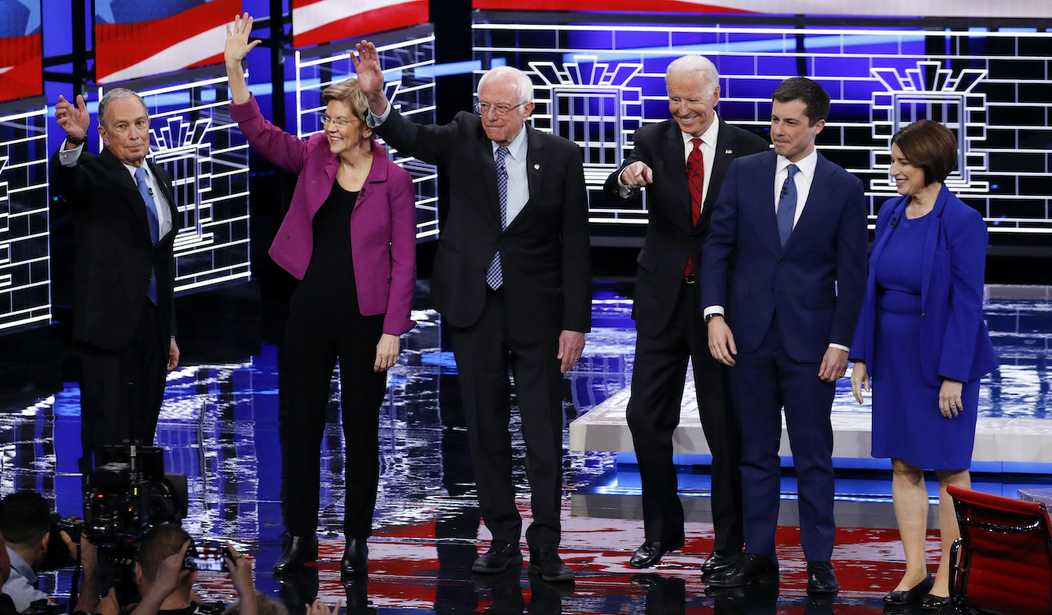The pre-Nevada Democratic debate was a gift to Donald Trump. Instead of training their fire on the incumbent, or on the vulnerable front-runner, Bernie Sanders, the candidates tore Mike Bloomberg to shreds while saving plenty of darts for one another. That nice young man Pete Buttigieg became that supercilious egoist needling Amy Klobuchar over trifles. Elizabeth Warren the policy wonk became Elizabeth Warren the Terminator. Bottom line: A clear win for Sanders, which can be seen as an indirect win for Trump.
Bloomberg had a dismal night. Coming out from behind the curtain of gauzy advertising was not kind to him. He was arrogant. Asked why he hasn't yet released his taxes he said, "I can't go to TurboTax." His apology/explanation for stop-and-frisk was stiff and unconvincing, as Elizabeth Warren and others were quick to point out. He could have framed it in terms that a Democratic audience would view sympathetically -- that the point of stop-and-frisk was to get illegal guns off the streets. He could have elaborated on his long-standing anti-gun activism (which has the advantage of being true). And then he could have said that while the program was successful in reducing crime, specifically murders and other gun crimes almost entirely in minority neighborhoods, it went too far and needed to be scaled back.
Also, in one of the worst word choices of this primary season, Bloomberg explained that he wouldn't release women from nondisclosure agreements because the contracts were "consensual."
Now might be a good time to reconsider the belief that money can buy the presidency. Remember Tom Steyer? I thought not. He's a billionaire who's still in the race for the Democratic nomination. He had spent, as of last month, $123,803,204.00. And what did that get him? He finished seventh in Iowa and sixth in New Hampshire. Due to low poll numbers, he didn't make the cut for the debate stage in Nevada.
Recommended
Sure, Bloomberg's billions make Steyer seem like a pauper, but money without message has a poor track record in American politics. Some wealthy candidates succeed. But many do not. Ask Michael Huffington or Meg Whitman. According to the Center for Responsive Politics, 263 millionaire candidates contributed at least half a million dollars to their own campaigns for congress between 2002 and 2014. Eighty-four percent of them lost.
Bloomberg has his virtues. He's a centrist and a good administrator with relevant experience. His passions for climate action and gun control track well with the Democratic Party. But his downsides, as we discovered at the first debate, are potential anchors:
--A history of vulgar comments to and about women.
--His age (78).
--His lack of human warmth.
If Mike Bloomberg's pure aim were to deny Donald Trump reelection, he would withdraw from the race and put his vast resources in the service of Amy Klobuchar. Among all of the Democratic candidates, she is the most likely to defeat Trump. Every other candidate, including Bloomberg, is dragging a ton of baggage.
Elizabeth Warren is vulnerable for her history of misrepresenting herself as a minority and for her embrace of hard-left policies. She claims to pay for her wish list of goodies by imposing a wealth tax that 1) might be unconstitutional; 2) would not remotely cover all her spending ideas; and 3) might dampen economic growth.
Pete Buttigieg has run the fourth-largest city in the 17th-most populous state in the U.S. His record was spotty. Crime increased by 70%. He is a great talker. So bright. But he is also the first openly gay man to seek a major party nomination. According to a 2020 Gallup poll, 78% would vote for a gay or lesbian candidate, which is better than the 29% who said so in 1983, but nowhere near the 96% who say they'd vote for a black candidate.
Joe Biden is older than Sanders and Bloomberg. His brain seems to have different ideas from his tongue about where his sentences should go. Also, he has to answer for 50 years of bad decisions.
Bernie Sanders is a festival of weakness. His proposal to ban fracking alone could lose Pennsylvania, and thus, the November election. Like a reverse magnet, he repels every suburbanite who crossed over to vote blue in 2018. Even most Democrats oppose "Medicare for All" and the rest of his dorm-incubated agenda. His past admiration of leftist dictatorships ("bread lines are good!") will haunt him. And that Gallup poll found that only 45% would vote for a socialist.
Amy Klobuchar is rumored to be tough on her staff. That's it. She's a solid, midwestern senator who wins in her home state by double-digit margins. She's sane and centrist. And she's the Democratic Party's only hope.
Mona Charen is a senior fellow at the Ethics and Public Policy Center. Her new book is "Sex Matters: How Modern Feminism Lost Touch with Science, Love, and Common Sense."

























Join the conversation as a VIP Member